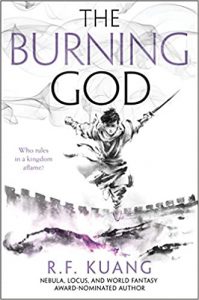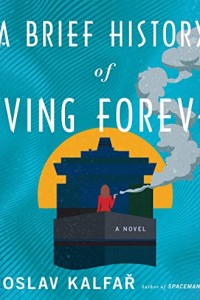Elsa Sjunneson Reviews The Burning God by R.F. Kuang
 The Burning God, R.F. Kuang (HarperVoyager 978-0-0626-6265-1, $26.99, 640pp, hc) November 2020.
The Burning God, R.F. Kuang (HarperVoyager 978-0-0626-6265-1, $26.99, 640pp, hc) November 2020.
As any writer will tell you, endings are difficult. Sticking the landing of an acclaimed trilogy that has garnered multiple nominations in its field? Yeah, that’s even more difficult, and R.F. Kuang does it beautifully in The Burning God.
The Poppy War Trilogy is the story of Fang Runin’s rise from obscurity to power, and how she claws her way to the top using any means possible. Rin has been described as an antihero, and it’s no different in this final chapter. How power shapes her is important, but truthfully it is how her power and her thirst for it shapes the choices that she makes for everyone else that is the core of the story in this third installment.
Rin makes not just painful choices, choices which any leader has to make, but she makes selfish choices in order to pursue the vengeance that she seeks on her own behalf, and it can be almost painful to watch as she decides how to deal with her past and the people who care about her in the ultimate quest for power. Kuang renders that hunger in ways that I found very effective.
Where I find Kuang is strongest is in how she deals with the descriptions of the magic, and how she handles colonialism. Every moment that the Hesperian’s spend on the page, every moment that we see how strange and different the Empire is from Nikara, reinforces how not all cultures are the same. It also (rightfully) depicts missionaries and the acts of white supremacists as violent, no matter whether the violence is done by medical testing, building churches where there were none before, or the act of placing whiteness as a center in a place where it never was before.
The costs are massive and they hurt, especially when those actions make the path to victory so much narrower. The Burning God shows that Kuang is a master of raising the stakes. However, I found myself frustrated by the depictions of disability in this book. At the end of The Dragon Republic, Rin loses her left hand. Su Daji loses one of her eyes. Both of them, now physically disabled, are at best antiheroes, and at worst, villains of the stories that other people would tell about them. While both characters are ultimately disabled in the course of their already established moral pathways, it’s tiring to see disability worn by morally corrupt characters. While I don’t believe that it was meant as metaphorical signaling, it’s always exhausting when a disability is a way to make a character vulnerable, or when it feels as though it is a tacked-on choice. I found no reason for Rin to need to be disabled by the end of this story, so there were much more interesting paths in which she could be taken down, most often, by herself.
Plot wise, almost every single loose end carried through the entire trilogy is tied up here, and while it doesn’t end exactly on a note where everything has been wrapped up finally, it leaves the reader the ability to imagine where Nikara will go.
I look forward to seeing what Kuang does next, as you’re always sure, in her hands, that the story will have high stakes and that those stakes will make you not just want, but need to know that how they will be handled by her flawed and compelling characters.
This review and more like it in the January 2021 issue of Locus.
 While you are here, please take a moment to support Locus with a one-time or recurring donation. We rely on reader donations to keep the magazine and site going, and would like to keep the site paywall free, but WE NEED YOUR FINANCIAL SUPPORT to continue quality coverage of the science fiction and fantasy field.
While you are here, please take a moment to support Locus with a one-time or recurring donation. We rely on reader donations to keep the magazine and site going, and would like to keep the site paywall free, but WE NEED YOUR FINANCIAL SUPPORT to continue quality coverage of the science fiction and fantasy field.
©Locus Magazine. Copyrighted material may not be republished without permission of LSFF.







